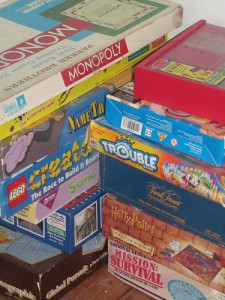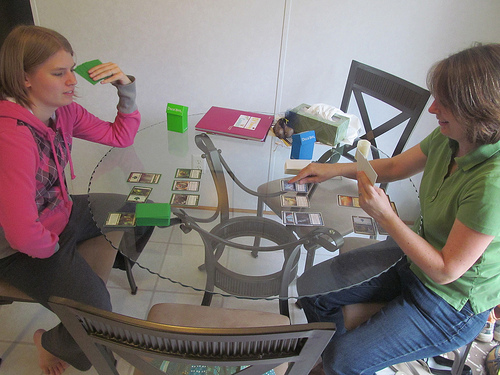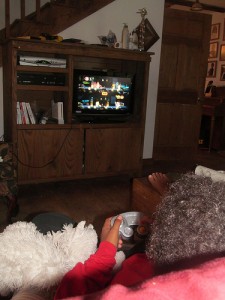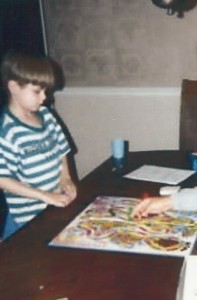 For a long time, I secretly felt guilty for not playing more board games with my children. Like reading aloud and putting together puzzles, I felt board games were a staple of childhood development. And yet, I had just as many board games available to my children as puzzles, probably more. So why didn?t my children play board games more often? I had a recent ah-ha moment that may answer that question and alleviate my guilt.
For a long time, I secretly felt guilty for not playing more board games with my children. Like reading aloud and putting together puzzles, I felt board games were a staple of childhood development. And yet, I had just as many board games available to my children as puzzles, probably more. So why didn?t my children play board games more often? I had a recent ah-ha moment that may answer that question and alleviate my guilt.
I was at a park day sitting in the grass as I listened in on a nearby conversation. One of the mothers was wondering to the leader of the organized activity if we should put together a board game day. The leader hesitated as she said that based on past attempts, this particular type of group didn?t really respond to that idea as an interest for most of the children. Most of the ?group type? were unschooled or relaxed homeschoolers. And then it hit me. When I?ve attended unschooling conferences, I rarely see children playing board games, although there are often those types of games available. But I always see a lot of unschooled children playing games such as Magic: The Gathering, hand-held video games, Dungeons & Dragons, video games, or Pokemon. And as I said in an earlier post, I hypothesize that many who are unschooled are right-brained learners.
 That?s it! It all makes sense now. There are games that appeal to left-brained people and games that appeal to right-brained people! This realization made me immediately go to my most recent experiences. My right-brained daughter has now been married to her left-brained husband almost two years. One of my first bonding times with him was having him on our family beach trip while the two were dating, and we played board games on his initiation for much of the time. I was in heaven, because I?ve always like board games, but come to think about it, most of my children have had no interest. Since the two married and moved in three houses down from me (woohoo!), I go to their house every Sunday evening for game night.
That?s it! It all makes sense now. There are games that appeal to left-brained people and games that appeal to right-brained people! This realization made me immediately go to my most recent experiences. My right-brained daughter has now been married to her left-brained husband almost two years. One of my first bonding times with him was having him on our family beach trip while the two were dating, and we played board games on his initiation for much of the time. I was in heaven, because I?ve always like board games, but come to think about it, most of my children have had no interest. Since the two married and moved in three houses down from me (woohoo!), I go to their house every Sunday evening for game night.
In the meantime, my son-in-law introduced and taught my daughter Magic: the Gathering, one of his childhood games he had enjoyed. She had been a Pokemon girl herself, but she decided to learn it. She was hooked and together they collected many cards and created diverse decks. After playing one particular board game most Sundays (The Settlers of Zarahemla, a version of Settlers of Catan) my daughter suggested I learn to play Magic. Frankly, it held no interest or draw for me, but my relationships with my two loved ones were, so I decided to learn as a way of connecting with them.

And so the teaching began. They claim Magic to be a strategy game, and mind you, I love strategy games, thus, why I like board games. But I just wasn?t wrapping my head around this game at all. I also consider myself quite an intelligent person, and I was really questioning my abilities a month, then two, into the learning curve and still feeling helplessly lost. What was going on here!? Frankly, I realized at that point that maybe it was more right-brained oriented (though I hadn?t leaped to the holistic idea of the types of games one is attracted to indicates brain processing preference). I barely noticed the pictures whatsoever when I played. I zeroed in on the numbers, but then there were so many things to remember?abilities, attack and defend points, payment of lands, if I could attack without being killed, if I could defend, etc. (Yes, I know those of you who understand Magic are probably laughing at my slaughter of terminology as we speak!)
I?m thinking this is a left-brained trait, but I?m ?loyal? (or is it predictable, controlled, or perfectionism?) to staying with one thing, ad nauseam. Finally, after not feeling like I was getting it after two months, I convinced myself to switch decks (from a Trample deck to a Spirit deck) and that version seemed to connect with me better, and I started to understand?a little bit. I truly had my eyes opened to being subjected to a process that made absolutely no sense to my way of viewing things. It certainly had nothing to do with intelligence, because I often smashed people when playing board games.
For my daughter, she tolerates board games. She?s not as naturally proficient at them as we left-brained family members. It?s especially evident in something like Scrabble, which I believe is highly left-brained. But put her with Pokemon or video games or now even Magic, she?s quite a force to be reckoned with. Now, you may be asking, but didn?t you say your son-in-law is left-brained? So why  does he do well with Magic? Well, because males are more leaned toward right-brained traits, so his male gene contributed to his ability to enjoy certain right-brained attributes. I think the visual and imagination qualities can be evident in certain males. This can show up in the male-dominated enjoyment of video games.
does he do well with Magic? Well, because males are more leaned toward right-brained traits, so his male gene contributed to his ability to enjoy certain right-brained attributes. I think the visual and imagination qualities can be evident in certain males. This can show up in the male-dominated enjoyment of video games.
So, what do you know, the reason all those board games didn?t get played with is because most of my children are right-brained dominant! I was the lone left-brained game player, and no one was interested. Likewise, I have had no interest in learning to play video games. Have no clue. It enthralls me that they can instantaneously know what to do and where to go in those things. Each type of game requires its own set of skills.
Now, I did have several children with autism who enjoyed playing left-brained games for a season. Why? Because many of these left-brained board games are very structured, predictable, and sequentially rule-based. Think of Monopoly, Candy Land, and Trouble. As evidence of my older son with autism?s draw to these games as a way to appease his need for predictability, I remember he  would ?stack the deck? of Candy Land when he was young. He would meticulously go through and arrange the deck so he knew exactly how the game would play out. And it wasn?t just about his wanting to win; sometimes he had himself win, and sometimes he had his opponent win. He just wanted to be able to predict it. It was really amusing and quite clever of him!
would ?stack the deck? of Candy Land when he was young. He would meticulously go through and arrange the deck so he knew exactly how the game would play out. And it wasn?t just about his wanting to win; sometimes he had himself win, and sometimes he had his opponent win. He just wanted to be able to predict it. It was really amusing and quite clever of him!
In conclusion, I love to play such games as Scrabble, Backgammon, and Trouble. My right-brained children gravitate to Magic: The Gathering, video games (especially RPGs), and Pokemon. One is not better than another. But I know we often try to get our children to play those left-brained games because of the sneaky ?educational value? (i.e., left-brained school subject practice like math facts and money management), but the right-brained games are all about problem-solving, imagination and creativity, and global game playing, which are in high demand in our global economy today. I?m telling you, everywhere I look, there?s a right-brained/left-brained connection!
Question: What games do you or your children like to play? Why do you think so?
tj holmes waste management two fat ladies dennys glen davis a christmas story prime rib
No comments:
Post a Comment